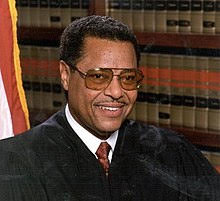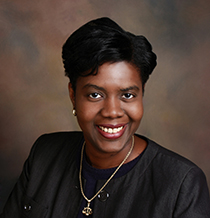By Christopher R. Thompson, Burr & Furman
On January 26, 2021, Judge Stephan P. Mickle, Sr. died at the age of 76, having lived an extraordinary and historically significant life, by any definition. I did not have the honor of meeting Judge Mickle, but Judge Karen Specie (Bankruptcy Court for the Northern District of Florida) had a unique friendship with Judge Mickle that began in 2012 by happenstance after her own appointment to the bench. Without an office or chambers to call her own in Gainesville, Judge Specie spent about three years working from the reception desks in the Gainesville District Court judges’ chambers, including Judge Mickle’s, in between hearings. Yes, you read that correctly. From 2012 to 2015, a United States Bankruptcy Judge spent multiple days a month sitting at and working from a reception area in the District Court Judges’ chambers in Gainesville.
Judge Specie’s unusual Gainesville workspace was a blessing in disguise. She had the great privilege and joy of lunching and chatting with Judge Mickle about his remarkable life. Judge Specie immediately recognized the significance of the stories and reflections Judge Mickle shared with her, so she frequently wrote or typed up notes of Judge Mickle’s stories immediately following their conversations. What follows are just some of the most noteworthy facts, anecdotes, and stories about Judge Mickle’s life that he relayed to Judge Specie during their time in chambers together, and which she generously shared with me during a recent phone conversation.
A life of firsts.
Judge Mickle was a trailblazer for Black people in many respects. In 1962, he was one of the first seven Black men to enroll at the University of Florida in Gainesville for undergraduate school. In 1965, he was the first Black student to graduate from UF. He was the second Black student to graduate from the University of Florida Fredric G. Levin College of Law. Following law school, in 1972 Judge Mickle became the first Black attorney to establish a law practice in Gainesville, and soon thereafter became the first Black law professor at UF.
In 1979, Judge Mickle was tapped to become a county judge in Alachua County, Florida, becoming the first Black judge to hold that position. Judge Mickle then became the first Black circuit court judge in the Eighth Judicial Circuit, then the first Black judge on the First District Court of Appeal in 1993, and finally, became the first Black judge for the U.S. District Court for the Northern District of Florida in 1998.
A solitary experience.
Reflecting on his undergraduate years with Judge Specie, Judge Mickle recounted the utterly solitary and frightening experience he had as one of the first African American students at UF. Although there were six other Black students who enrolled at UF the same year he did, Judge Mickle never had a class with them and was unable to interact with any of them socially. The only other Black people he saw on campus were the janitors, who would not talk to him for fear of “getting in trouble.”
Judge Mickle spoke bluntly when describing his undergraduate experience: UF was “hostile and frightening” during this time. It was like living in a “wall of silence”; nobody spoke to him on campus, instructors never called on him in class, and his professors and instructors communicated with him only if he asked a question. As Judge Mickle put it, he had “no classmates.” He had no friends on campus, and as a Black student, he was not invited to participate in any social events or extracurricular activities at the University. He did not attend sporting events. Asked if he would do it all over again, Judge Mickle gave a resounding, unequivocal “No.”
A life of perseverance.
Despite Judge Mickle’s horrific undergraduate experience, he was undeterred from pursuing and obtaining both a master’s degree and a J.D. at the University of Florida. Thankfully, Judge Mickle had a better law school experience. He recalled being much happier in law school because, at least outwardly, no one questioned why he was there. He had a regular study group, which was comprised of primarily Jewish students from South Florida. His classmates voted him Vice President of his senior class at law school, and he made lasting friendships.
This is not to say that within five years of its integration UF’s campus had been purged of its racist, segregationist past. Judge Mickle recalled attending UF football games when the band played “Dixie” and students would stand and wave Confederate flags. And the Alachua County Courthouse remained segregated, with separate water fountains and bathrooms for “whites” and “coloreds,” while he was in law school. UF’s Black student population also remained incredibly sparse; through seven years of classes at UF while obtaining his undergraduate, master’s, and law degrees, Judge Mickle never had a class with another Black student.
After law school, and after a brief experiment with cold weather living in Washington, D.C., Judge Mickle returned to Gainesville in 1972 to enter private practice. He was the only Black lawyer in private practice in Gainesville at the time. It did not take long for him to establish a strong reputation as a lawyer within the Gainesville legal community.
In law school, Judge Mickle tutored Black pre-law students through the Council on Legal Education Opportunity (CLEO), which was designed to help minority students gain entrance into law school. He continued teaching through CLEO upon returning to Gainesville. While teaching one day, the Dean of the University of Florida law school sat in on a class to observe Judge Mickle. After class, the Dean offered him an assistant professor of law position, making Judge Mickle the first Black law professor at UF. And just a few years later, in 1979, then Florida Governor Bob Graham called Judge Mickle to offer him his first judgeship on the County Court for Alachua County. Judge Mickle would spend the rest of his life—nearly 40 years—behind the bench in various courts.
A life partner.
Judge Mickle was not alone on his life journey; he had the support of his wife and life partner, Evelyn Mickle. The two met the summer before Judge Mickle started law school, and they were married the following year. Evelyn was one of the first five Black students to enroll at the UF College of Nursing in 1965. She was the first Black student to graduate from that program with her B.S.N. in 1967. Although both Evelyn and Judge Mickle had terrible, demeaning experiences integrating UF, neither carried any bitterness with them. Instead, they used their experiences to fuel the rest of their incredible lives together.
A gentle giant on the bench.
Judge Mickle maintained a reputation for being humble, kind, mild-mannered, thoughtful, and attentive throughout his many years on the bench. Judge Specie, who had cases in front of Judge Mickle when she was in private practice, described Judge Mickle as someone who “truly listened,” who made eye contact while listening, and who was always polite to anyone appearing before him in court. He took one of her matters under advisement and, judging by the well-reasoned decision he issued, she knew that he spent a good amount of time considering the case and the arguments made by both sides. Judge Specie could not recall anyone ever having anything negative to say about Judge Mickle.
A life of dedication and faith.
It is a great testament to Judge Mickle’s character and capacity for forgiveness that he did not let the negative experiences in his early years turn into bitterness against an unjust society. Instead, Judge Mickle made it his life’s mission to do what he could to advance educational opportunities for African Americans and other minority groups. This mission began in law school when he began teaching and tutoring Black pre-law students through CLEO. Judge Mickle continued to dedicate his time to open doors for Black and minority students the rest of his life.
Judge Mickle discussed and shared ideas with Judge Specie about how best they could help all law students get good jobs, and how they could prevent law school grads from developing bad habits in private practice. While Judge Mickle acknowledged and was encouraged by the great progress on race relations that the country had made since he was an undergraduate student, he still felt there was work to do to ensure that the doors to educational opportunities were open to all.
Judge Mickle’s positivity and dedication to the betterment of society derives in large part from his Christian faith. His father was a preacher, and he recalled spending the entirety of every Sunday at church. He remained a deeply religious man throughout his life. One of his favorite scriptures—that also became one of Judge Specie’s after she heard it from him—was “He has shown you, O mortal, what is good. And what does the Lord require of you? To act justly and to love mercy and to walk humbly with your God.” (Micah 6:8 New International Version) By all accounts, Judge Mickle followed these instructions dutifully. He committed his life to the cause of justice and was a merciful and humble servant from the bench.
A lasting legacy.
Judge Mickle’s life will always have great historical significance. The long list of “firsts” in his life ensures his place in the history books. That list, and the tough obstacles he faced in achieving those “firsts,” are impressive and significant in their own right. But almost equally impressive is how Judge Mickle lived his life and treated others in the face of a society that did not welcome his participation.
Those who knew Judge Mickle were fortunate. During our conversation, it was easy to hear Judge Specie’s deep and genuine gratitude for Judge Mickle’s generous friendship and conversation. To this day, Judge Specie keeps a copy on her chambers desk of something Judge Mickle kept on his: a copy of a “Memo From God,” which reminds her that there are some things best left in God’s hands, and to have faith that God will resolve those things in His time. Judge Mickle’s impact on those lucky enough to have known him may be his most meaningful legacy.


